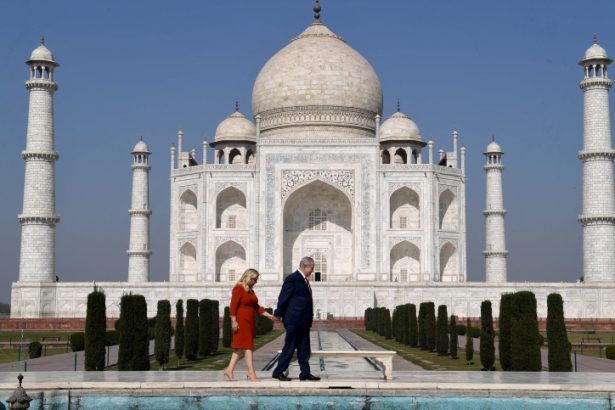Dr Khinvraj Jangid is Director of the Centre for Israel Studies at Jindal School of International Affairs, OP Jindal Global University in Delhi. He argues that the time is ripe to build on the huge strides forward in India-Israel relations made in recent years at the level of political and economic elites by a bottom-up normalisation through person-to-person contacts and cultural and academic engagement projects.
India’s diplomatic choices before and after independence were guided by the principles of anti-imperialism, anti-colonialism and Third World solidarity. Partition of Indian sub-continent, the rise of religious state like Pakistan and its military intrusion into Kashmir were immediate imperatives as well. State of Israel was not significant enough from diplomatic vantage point. However, the leaders of Indian national movement took interest and position in the Israel-Palestinian-Arab conflict. Having sought British support through the Balfour Declaration in 1917, the Zionist movement was ‘contaminated’ by colonialism and as such, poles apart from how the Indian national movement saw itself. That breech was deepened by the choice of Zionist leaders to build strong relations with the West, particularly the imperialist West, instead of choosing solidarity with the struggling Asian national liberation movements.
Thereafter, independent India had more sympathy and support for the Palestinian cause and the Arab world than for Israel, reluctantly recognising her as a sovereign state in 1950 without the concomitant diplomatic engagement. David Ben-Gurion, Israel’s first prime minister, once said that friendship of one nation of Europe was more valuable than the public opinion of the all Asian people. Yet, he made multiple attempts to reach out to Nehru for friendship. He admired Gandhi very much and kept on praising Nehru for his political modernism, leading democracy and secularism in India. Israel was further tainted as an aggressive actor, conspiring with ex-imperial powers, after the 1956 Suez War; and then an occupier of the Palestinian lands, after 1967’s Six Day War.
India normalised relations with Israel in 1992 in the wake of the end of the Cold War as part of a major overhaul of foreign policy that also involved establishing strategic ties with the United States. Indian politicians and policy analysts presented this rapprochement as a win-win scenario driven by capitalism – an ideology that charmed both nations in the early 1990s. From $200 million in 1992, largely in the diamond industry, merchandise trade has rapidly diversified, reaching $4.16 billion (excluding defence) in 2016.
Over the years, India has moved discreetly to expand the relationship beyond trade, deepening its military and strategic partnership with Israel. Significantly, the Indian state has been less circumspect in recent years in promoting multifaceted collaborations with Israel. In 2017 Narender Modi became the first Prime Minister of India to visit Israel. This turn has been called, by many observers in both India and Israel, ‘coming out of the closet’ and one often hears that ‘the sky is the limit’ to what the two states can do together, materially speaking. There are many areas of collaboration beyond the traditional military and defence such as agriculture, water conservation (like just concluded Bundelkhand Water Project in the largest state of Uttar Pradesh), space technology, higher education etc. India and Israel have shown alertness to grab opportunities out of crisis such as COVID-19 where they are working together on testing non-intrusive and rapid diagnosis with the Israeli medical experts sampling in India due to its large pool of infected people.
However, this diplomatic euphoria and political/policy level enthusiasm has not extended to Indian academia, civil society, and left/progressive or liberal intelligentsia circles. Normalisation has remained an issue for Israel in India, even after the emergence of the strategic partnership in recent years. Diplomatic normalisation (very much of the moment, following Israel’s recent establishment of ties with UAE and Bahrain) is not enough. Normalisation, it seems, takes much more than diplomatic ties; it needs person-to-person contact and cultural and academic engagement, in addition to the opening of elite political gates.
Images of Israel in India
There are three dominant and clashing images of Israel which shape India’s engagement with it.
‘Settler-Colonial State’
The first image is that Israel is a ‘settler-colonial state’, inspired by the once-important Marxist-Leftist perspective and the unfriendly political view that Mahatma Gandhi and Jawaharlal Nehru took of Zionism as a national movement. Zionist leaders, and later the State of Israel, established tactical links with the colonial powers rather than identify with the anti-colonial ideological mindset pioneered by Gandhi and Nehru. They both acknowledged the underlying rationale of Jewish nationalism, but saw it as responsible for wars and the displacement of the Palestinian people. The image of Israel as a settler-colonialism also runs through progressive and the socialist/leftist groups, public intellectual discourse, and in the elite corridors of universities. Even today, it still lingers in such opinion-building spaces (albeit limited to the English-language sector).
‘Model Religious Nationalism’
The second image of Israel in India is the model aggressive religious nationalism. India, in the eyes of many who subscribe to the ideology of Hindutva politics, should be a ‘Hindu nation’, a militarily strong and aggressive state. For them, Israel is the good example to follow. This image has gained currency since 2014 when the Bhartiya Janata Party (Indian Peoples’ Party) began to dominate national politics in India under the leadership of Narender Modi. Modi’s ‘new India’ – a phrase he coined to describe a newly confident, and proudly nationalistic state – draws on a weaponised version of Hindu political identity. Modi and the BJP are ideologically wedded to the idea of India as a strong state; such a conception slides easily into the idea of an aggressive state, willing to retaliate with force against belligerent neighbors. On entering national politics, Modi famously boasted that he had 56-inch chest, and claimed to have solutions for everything – including long-running disputes with Pakistan and China. Modi made telling reference to Israel in a speech that he delivered in Himachal Pradesh after the surgical strike against Pakistan in 2016. To everybody’s surprise, he praised Israel as a strong state, one that India should emulate in its fight against Pakistan-based terrorism. In his words, ‘Our army’s might is discussed across the country these days. We used to hear earlier that Israel has done this. The nation has seen that Indian army is no less than anybody [others].’
Majority communities in India and Israel perceive their national territories as ‘holy lands’: Bharat Mata (mother India) or Pitra-Bhoomi (fatherland) in the case of India, and Eretz Ha’kodesh (the holy land) or Ha’Aretz Ha’Muvtahat (the promised land) in the case of Israel. The ideological alignment between India and Israel around cultural-religious nationalism, coupled with shared neo-liberal free market sentiments, is an important driving force in the relationship today. The way each state defines its national identity has a direct link with the attitude of the one nation state towards the other. The rise of BJP and its ideology underpins the flourishing of bilateral ties as much as the Nehruvian ideology counted against those ties in the past.
‘Powerhouse State’
The third image of Israel, gaining traction with young Indians in particular (something I have encountered first-hand when teaching the foreign policy of Israel), is a fascination about the capabilities of Israel, from the Mossad and the army to ‘Start-Up Nation’. When asked why they have chosen to study Israel, many of the students I teach describe how enamoured they are with the power of Israel. It is the geo-strategic achievements (overlooking the failure to establish peace and reconciliation with the Palestinians) of the State of Israel that they refer to, rather than the complex history of the Jews prior to the state, encompassing anti-Semitism across two millennia or the Holocaust. For example, millions of young minds have fallen in love with the Israeli TV series Fauda. Violence, by the state or for the sake of the state, is legitimate, even desirable, in their eyes. The popularity of this particular Israeli TV series, and not the introspective domesticity of Shtisel (a drama set in an ultra-Orthodox Jewish community, equally popular in Israel) is telling.
Beyond Images, Beyond Ideology
Young Indians have been exposed to a militaristic, aggressive form of nationalism, coupled with swagger and machismo, since the rise of Narender Modi (also due to the legacy of realpolitik of Indira Gandhi, the first female Prime Minister). In the light of the changing domestic political values – from peace, non-violence and compromise, to violence, jingoism and revenge in the name of nation – it is no wonder that this idea of Israel-the-Strong resonates with young Indians. However, this growing enchantment is creating an image of Israel that reduces it to a military state, lacking any socio-cultural complexity, or indeed any contradictory political views among its people. In popular parlance, it has moved Israelis from one extreme to the other – from settler-colonial-state to the all-powerful-friend-India-must-have that it emulates. Either way, it is disabling simplistic, losing sight of a people grappling with their political destiny, like the people of India, or for that matter any post-colonial state in Asia, a country still having to negotiate between religion and modernity, nationalism and universalism, neo-liberalism and the welfare state, and still having to pursue conflict resolution / management. Indians would do better to examine Israel as a society strikingly similar to India and to do comparative analysis of the deeper political and social conflicts that both nation states have gone through since their independence—the inner fight between religion and secularism, the socio-cultural tension between democratic socialism and open-market neo-liberalism, and the much troubled political issue of majority-minority relations.
However, at present, in the privileged universities in metropolitan Indian cities, Israel is first and foremost an ideological issue not a subject for careful scholarly analysis. One can’t talk about Israel without raising suspicions about one’s politics, or without first placing on table one’s loyalty to the Palestinian cause. I run the very first centre for Israel Studies in India, at OP Jindal Global University and I am often questioned by colleagues and students who have been told that they will harm their professional prospects if they associate with the centre. I have been questioned closely by friends and colleagues, suspicious of my core values, since taking on the role of running the centre. As yet, Israel Studies is not like China Studies or America Studies – a subject of academic inquiry. Israel studies remains, as it is on many American and European campuses, caught between claims of advocacy and scholarship. In India, it is time for some legwork on Israel awareness, first and foremost, going beyond simplistic images to a deeper understanding as the basis of a deeper relationship.





































